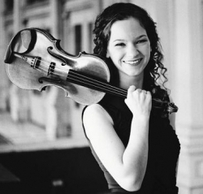
HH: Hello, this is Hilary Hahn. I’m here in a dressing room in Paris, to interview –
HH: Welcome – nice to have you here! So what made you decide to become a fish?
JH: It seemed like the best option at the time. And of course everyone else in my family was also a fish. That may have influenced my decision.
HH: Was it something you always wanted to do – be a fish?
JH: I once thought of becoming a fireman – but looking back on that, I can see it wasn’t a line of work I was well suited to. I think that being a fish has worked out better than the fireman idea would have.
HH: I could see that. You’re a betta, and you came from Thailand, I presume, because bettas are Siamese fighting fish. So can you tell us a little bit about that trip? What was that like for you?
JH: Not every betta gets to end up in a bowl in Paris. The competition is intense, and I really had to fight my way out of the rice paddy and on to the international fishbowl circuit.
HH: That must have been a culture shock!
JH: Believe me, a fishbowl is nothing like a rice paddy!
HH: When you first got to your new home, what did you think of it?
JH: To be honest, my initial impression was that the orange plastic flowers were horrid! But I needed something fast, so I had to take the place as is. One of these days I’ll bring a decorator in here, and have some work done.
HH: Was it comfortable? Was it chlorinated?
JH: One of the things you have to deal with on the international fishbowl circuit is the chlorine. In some places it was so bad that I had to have a “no chlorine” clause put in my contract. So now things are better.
HH: So where are you living now? I mean, I see the bowl – but where are you located? What city?
JH: When you're looking at the world out of a fishbowl, one city starts to look pretty much like any other. What’s important to me is not where I am, but that my audience truly appreciates what I have to say.
HH: Do you get to explore very much, or are you really busy with work?
JH: I have a pretty demanding schedule, because in a fishbowl you’re on stage all the time.
HH: I can imagine!
JH: My fans have high expectations – and, I must say, can sometimes be a little intrusive. But my duty to my public is a responsibility that I take very seriously.
HH: It must be quite a challenge.
JH: It’s hard to make room for any kind of private life: time for friends, family and vacations.
HH: How do you balance all of that?
JH: I’ve learned that the best way to deal with it is to just go with the flow.
HH: Do you have any advice for people who would like to become fish, someday – and how you get started?
JH: The first thing you have to understand is that there are a lot of fish in the sea. So to get anywhere you have to be noticed. Winning a major competition can help – and of course you’ll need a good manager who really believes in you.
HH: And what’s your favourite thing about it – about this lifestyle of being in a bowl?
JH: One of the nice things about being a fish is that your memory only lasts for about 30 seconds. I can swim all the way around the bowl, and by the time I get back to where I started, I think I’m in a new place that I’ve never been in before. Life is a non-stop adventure for a fish in a bowl!
HH: It sounds wonderful!
JH: It works for me.
HH: Thank you for joining us today, and for introducing yourself. I have to say you are the first betta I have ever interviewed, so thank you for the honour. I guess we’ll be watching your work. Good luck! Bye!
 RSS Feed
RSS Feed

